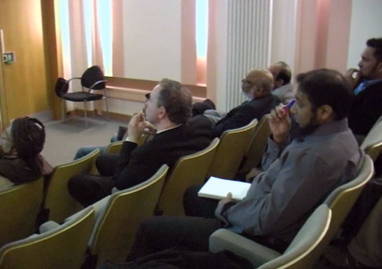

Now I want to give you an example from the UK context, Mahbub, whom I interviewed several times and I have known him ever since I started our research in 2008, so I have known him before and after he got married. About 18 months ago he got married to a woman, also a member of the same Sufi organization that he belonged to, the Hijaz community. He talks here about how their share values and the structure of both Islam and the organisation (i.e. Hijaz) helps them in sustaining their marriage:
Ideally I think both of us would like to develop ourselves in our marriage on something which reflects the marriage of the Prophet with his wife, and this means to me that we slowly nurture a structure which is based upon that which the Prophet did. The two of us, and the community that we are part of, we follow the same form of Islamic governance, personal governance, you know; we can have that relationship based on the framework of Islam because everyone who's part of that, to a greater or lesser degree, follows the same morals and ethical principles and conscience.
As you can see the question of having a structure or framework for life is very important for Mahbub and his wife.
The next slide comes from a discussion I had with Mahbub and some of his friends in a focus group. I asked them what 'love' meant to them or in Islam. He said:
My definition of love is to want to be like the object of your love, to think about them all the time, to talk about them with everyone . . . These are all very deep, very powerful emotions, and, you know, manifest in very powerful actions but you couldn't have that in a husband and wife relationship unless the other person was having that divine love for God. Patience, tolerance, servitude, selflessness, these can only exist if at least one of the people have that relationship with God. Because the energy to sustain that comes from Him, and that relationship, it won't come from the other person.
The way I understand this, was that he was talking about a triangular relationship; the husband and wife are united through their common love for Allah. Unless you have your love for God, then your relationship with your husband or wife cannot be sustained.
Now I move on to another British Bangladeshi woman I call Shirin. She is not a member of any Islamic organisation, but like many of our other interviewees, she also only turned to Islam quite recently. She said for the last 5-6 years she has been looking for a suitable husband, and had been having difficulties. She has finally found someone. I spent one whole afternoon with Shirin, interviewing her, just two months before she got married. At that time Shirin was telling me how she was avoiding having much interaction with her future husband, and as Geoffrey was saying, there are a lot of Islamic rules and protocols to avoid all kinds of interaction if at all possible for reasons that she gives:
Because, you know, it can just as well not work out. You might hear that it's not going to go ahead for whatever reason. Only Allah knows how it will all work out. So it's for your own protection. If you have a bad relationship it affects you in your future relationships. I know many men and women, you know, they end up hating women or men, or not trusting them because they had a bad experience before. Or some men or women, they take advantage of their partner and when they get tired of them they just drop them. It's for protection against this kind of things. And also against diseases and children who don't know who their parents are, and that kind of thing, and to protect the family unit as well.